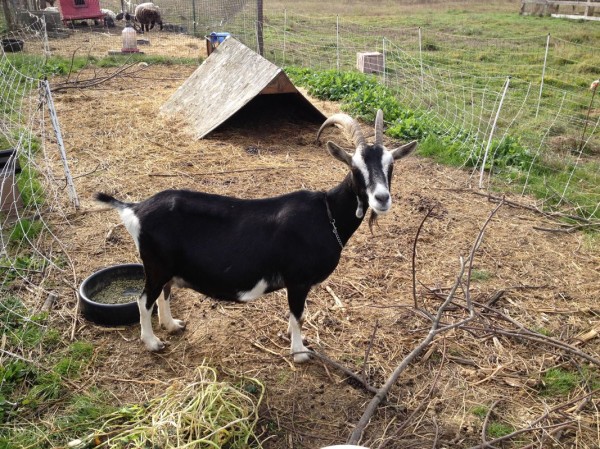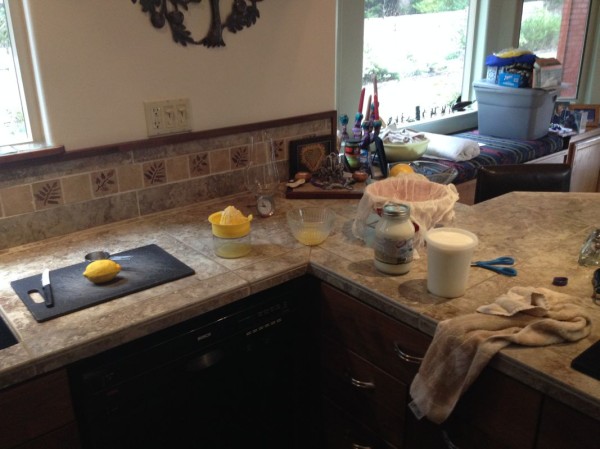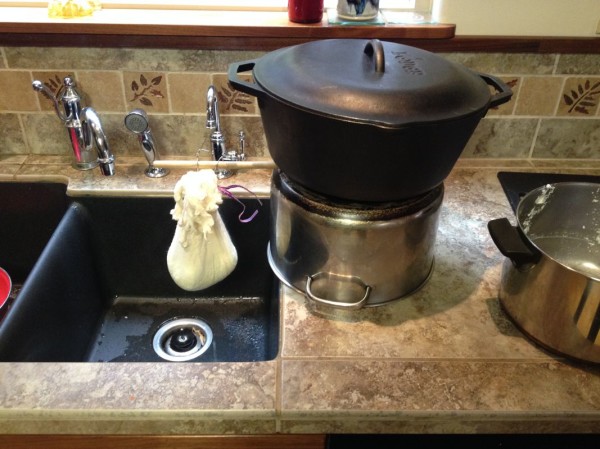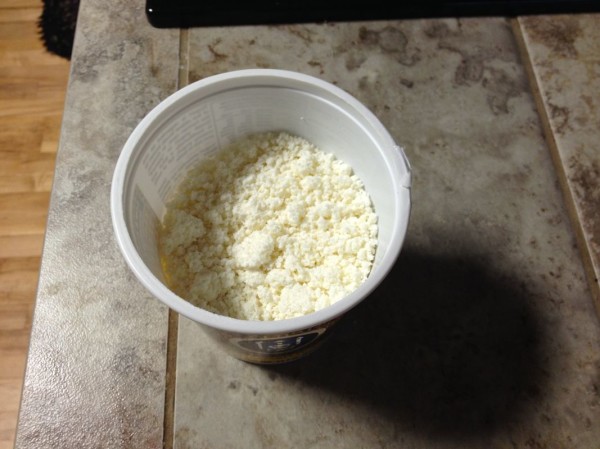Journal #6: From Teat to Table
by Miles Raymer
Last week, I experienced something that could only be considered “special” by someone from a generation out of touch with food production. It all began with Polly the goat.
Polly is a beautiful and affable nanny from Tule Fog Farm; I milk her first thing when I arrive every Wednesday morning. When I first learned to milk Poly, I was surprised at how rough I had to be to get the job done properly, but Shail reminded me that we are almost certainly gentler with her than Polly’s kids would be while nursing. I have enjoyed learning to clamp my fingers securely at the top of the teat and apply pressure downwards, which forces the milk out. It proved trickier than I had imagined, but became quite fun and relaxing once I started getting the hang of it. It helps that Polly is a very agreeable goat. A few weeks ago, to my dismay, she picked up her leg and put her hoof right into the milk bowl just as I was finishing up. This has been our only major blunder together, and I think it’s highly probable that it was my fault, as I may have inadvertently and prematurely signaled to her that we were finished. But aside from that one incident, we are developing a good rapport.
Polly’s milk is delicious, so it was a distinct pleasure last week when I took it home, combined it with a small amount of lemon juice and salt, and came out with fresh goat cheese. The lemons were locally grown, but not by me, and I also did not produce the salt, so I can’t exactly say that I participated in the production of every component of the cheese, but it’s definitely the closest I’ve ever come to processing a food from its raw state to something I could see myself purchasing at the store. Unlike consuming the fruits and vegetables we grow, which I usually just pick and eat raw or toss into a soup or salad, producing this goat cheese felt like truly making something. I know that’s probably an emotion that I’ve fabricated to romanticize my enjoyment of having done something novel, but it felt great just the same. It was satisfying, in the true sense of the word. I owe a big “thank you” to Ma, who suggested I make the cheese and also found simple instructions online to get me started.
I was surprised at how easy it is to make simple goat cheese, or “farmer’s cheese.” All you need is a quart of goat milk, 1/3 cup fresh lemon juice, and salt for tasting. As I already had a quart of milk from my previous week at Tule Fog, I doubled the recipe.
First, I put the two quarts of milk into a pot and slowly heated it to about 180 degrees. While I was waiting, I cut up and squeezed three lemons, which provided the 2/3 cup of juice that I needed. When the milk reached the right temperature, I turned the heat off and stirred in the lemon juice. Then I let the milk sit for 10 minutes to curdle. After that, I poured the curds and liquid into a colander lined with a cheese cloth, which, as it turns out, is in fact designed to facilitate the production of cheese. Then I tied the corners of the cheese cloth into a bundle and hung it over the sink for 90 minutes.
Next, I scraped the cheese into a container and added salt until I was satisfied with the taste. In the end, I produced a little more than a pint of cheese. That’s it! Upon finishing, I experienced a resounding sense of wonderment that people don’t do this sort of thing more often. And while I’m sure there are plenty of folks out there already making their own tasty goat cheese, I hope that in the future more people will try this fun and exceedingly simple method. The cheese works great as a topping for salads as well as pasta and many other dishes. I intend to make it regularly.
In other news, I recently learned that “Chris,” a man I tried to assist in his efforts to avoid losing his federal housing voucher back in November, has officially been denied his final appeal of the Housing Authority’s decision to revoke his voucher (see Journal #2 for details). Chris is now unable to pay his rent and will soon become homeless. While this news certainly is nowhere near as disturbing for me as for Chris and those more closely involved in his life, it did serve as a rather disheartening anecdotal confirmation of some of my worst intuitions about the systemic problems plaguing American society. When a seriously ill man with no history of violence or criminal behavior ends up on the street because of a single bowl of marijuana, the government has unequivocally failed not just the individual in question, but also the greater community that has invested both its trust and public funding in a structure designed, at least ostensibly, to provide security and enrichment, not needless persecution. I’m not someone who generally sees much sense in calls for radical revolution, but I do believe strongly in genuine human progress. More and more, I think that progress must come from individuals acting on their own personal motivations; we simply can’t rely on existing power structures to necessarily provide or encourage ethically defensible options for action. So, stay strong, and keep getting out of bed in the morning to work for your vision of a better world. We need every pair of hands we can get.



